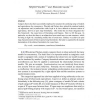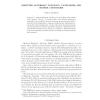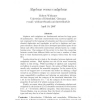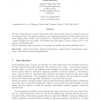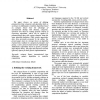123
click to vote
JSI
1998
15 years 1 months ago
1998
Abstract. Category Theory is introduced as the mathematical model for object-oriented systems which are distributed, heterogeneous, real-time, embedded, and open-ended. Each object...
ENTCS
2006
15 years 2 months ago
2006
Category theory has been successfully employed to structure the confusing setup of models and equivalences for concurrency: Winskel and Nielsen have related the standard models nc...
114
click to vote
ACS
2007
15 years 2 months ago
2007
Directed Algebraic Topology is a recent field, deeply linked with Category Theory. A ‘directed space’ has directed homotopies (generally non reversible), directed homology gro...
148
click to vote
ACS
2008
15 years 2 months ago
2008
Algebras and coalgebras are fundamental notions for large parts of mathematics. The basic constructions from universal algebra are now expressed in the language of categories and ...
148
click to vote
EFDBS
2003
15 years 3 months ago
2003
A definition of types in an information system is given from ld abstractions through data constructs, schema and definitions to physical data values. Category theory suggests tha...
109
click to vote
CIE
2008
Springer
15 years 4 months ago
2008
Springer
We study perfectly locally computable structures, which are (possibly uncountable) structures S that have highly effective presentations of their local properties. We show that eve...
121
click to vote
CTCS
1987
Springer
15 years 5 months ago
1987
Springer
of this paper is to prevent the abstract data type researcher from an improper, naive use of category theory. We mainly emphasize some unpleasant properties of the synthesis funct...
AMAST
2004
Springer
15 years 5 months ago
2004
Springer
Abstract. This paper shows how systems can be built from their component parts with specified sharing. Its principle contribution is a modular language for configuring systems. A c...
115
click to vote
SYNASC
2006
IEEE
15 years 8 months ago
2006
IEEE
The paper focuses on means of defining parameterized type categories and algorithms built on such types in Mathematica. Symbolic algorithms based on category theory have the advan...

